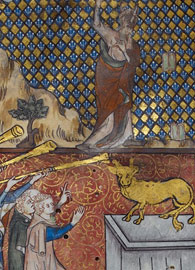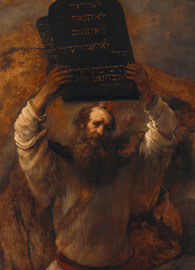Selections From Israel's Story Week 4
The Golden Calf: Exodus 32
By Sara Koenig
Seattle Pacific University Associate Professor of Biblical Studies
Read this week’s Scripture: Exodus 32
15:31

 Enlarge
Enlarge
From Covenant Sealing to Covenant Breaking
Our last Lectio ended with Exodus 24, and we have skipped over chapters 25–31, in which God gives Moses instructions about the tabernacle. It makes dramatic sense for us to move from Exodus 24 to Exodus 32: Chapter 24 was when the covenant was sealed, and Chapter 32 is when the covenant is broken. But we cannot miss the importance of the intermediate chapters, and the context they provide.
Chapters 25–31 give instructions about the tabernacle, Chapters 32–34 recount the problem of the golden calf, and Chapters 35–40 return to the topic of the tabernacle. The story of the golden calf is literarily and literally in the middle of God’s Torah on tabernacle, and, within that context, the problem becomes even more serious.
The Tabernacle
Tabernacle is both a noun and a verb. As a noun, its meaning is fairly complex, encompassing the “tent of meeting” [Author’s Note 1] and the various things inside the tent, including the “ark of the covenant” [Author’s Note 2]. One of the benefits of the tabernacle is its portability — as the Israelites move from Mount Sinai to the Promised Land, they can disassemble the tabernacle for travel, and reassemble it when they stop to camp.
As a verb, tabernacle means “dwell”: God will tabernacle with the Israelites, will pitch God’s tent in their midst. The people’s explanation that they want a god “who will go before us” (32:1) is ironic at best within a text that describes God’s plan to tabernacle with them.
This chapter is one of the most dramatic in the entire Old Testament, based on what is done and said by the Israelites, Aaron, Moses, and God. But adding to the drama are the different places within the story where motivations and words are not entirely clear, and those will be noted below. Ultimately, this story is about God’s covenant with Israel: a covenant that is maintained — despite what the Israelites do — by and because of God.
In this first verse, we encounter the first ambiguity: Moses’ long absence from the Israelites. When we last saw Moses, he was going up to meet God on Mount Sinai, and Exodus 24:18 tells us that he remained on the mountain for 40 days and 40 nights. That number is not always meant to be read literally in the Bible; it can represent a full period of time.
According to Verse 1, it was “when the people saw that Moses delayed to come down from the mountain” that they approached Aaron and asked him to make them a god. It is not clear whether the people had been told how long Moses would be and he truly was late, or the “delay” was simply their perception and they were impatient. Either way, they instigate what is to follow.
There is another ambiguity that is built into the Hebrew word elohim. It is translated in most English versions as “gods,” but can also be translated as the singular noun “God.” Are the people asking Aaron to create other gods for them to follow, or are they asking for Aaron to fashion a physical representation of God? Or it could be that the people are asking for other gods, but Aaron hears their request differently. In Verse 5, Aaron declares a festival to the LORD, which would support that, at least in Aaron’s mind, the golden calf is an image of the LORD.
Third, are the people gathering “against” Aaron in a hostile manner? The same string of words that is used in Exodus 32:1 appears in Numbers 16:3 in an explicitly threatening act. But the text records no protest from Aaron and no statement about his fear. He responds to the people’s request with one of his own, that they bring him the golden rings from their ears [Author’s Note 3]. After Aaron receives the raw materials, he fashions it into the form of a calf. Here, too, the Hebrew is not clear as to whether Aaron shapes the calf with a graving tool or casts it into the mold, but, aside from the specifics of how, the text is quite clear that Aaron did make this object.
Why a Calf?
Several people have wondered about the choice of a calf. In Egypt the bull symbolized the god Apis, while in Canaan it represented Baal. Again, we must return to the ambiguity in the word elohim. Did Aaron make a foreign god for the Israelites to follow, or did Aaron make a physical representation of the LORD, choosing a familiar object? Is this a breaking of the first or second commandment?
Either way, the people immediately assign the image a function: in Verse 4, they — and not Aaron — say, “These are your gods [Author’s Note 4], O Israel, who brought you up out of the land of Egypt!” After Aaron proclaims the ensuing festival to be directed to the LORD, the people perform a fast-paced series of actions: in one verse (Verse 6) they rise, they offer, they bring sacrifices, they sit down, and they rise up to “revel” [Author’s Note 5].
Verse 7 changes locations from the base of the mountain to the top, where the LORD tells Moses to “Go down!” God’s command is followed by the reason: the people are acting perversely. God describes the people to Moses as “your people, whom you brought up out of the land of Egypt” (32:7) and Moses does the same, asking God, “why does your anger burn hot against your people, whom you brought out of the land of Egypt …” (32:11). It is as if neither one wants to claim ownership of the Israelites!
Several commentators have noticed that God’s severe punishment, “I may consume them” is conditioned on Moses’ agreement to God’s statement, “let me alone.” It is as if God has opened up the door to Moses to intercede, in contrast to a passage like Deuteronomy 3:26, where Moses has no say. But that must not diminish the seriousness of the threat, nor the intensity of Moses’ intercession — according to Deuteronomy 9:18 and 25, Moses lies prostrate before the LORD, praying for the people for another 40 days and nights.
Does God Change God’s Mind?
When Moses responds to God, he does not give God any excuses or apologies for the Israelites’ actions. Instead, he makes three different appeals to God:
- First, Moses refers to the history of God’s deliverance of the Israelites from Egypt (32:11).
- Second, Moses wonders about God’s reputation among the Egyptians (32:12).
- Third, Moses calls God to remember Abraham, Isaac, and Jacob, and the promise that was made to them.
And immediately after Moses’ appeals, we read, in the New Revised Standard Version, “And the LORD changed his mind about the disaster that he planned to bring on his people” (32:14). Different English translations soften this statement: the Jewish Publication Society Translation reads, “the LORD renounced the punishment he had planned to bring on his people,” and the New International Version reads, “Then the LORD relented and did not bring on his people the disaster he had threatened” [Author’s Note 6].
There are theological dangers if we push too hard on either side of this issue. On the one hand, if we overemphasize that God can — and does — change God’s mind, where is God’s omniscience? Why would God change if God knows all things that are going to happen? If we argue that God has been convinced by Moses’ appeals, where is God’s omnipotence? What kind of sovereignty does God have if a mere human can talk God out of what God planned to do?
On the other hand, if we overemphasize that God is in complete, total control; that God has a plan for everything that is to happen from before the foundations of the earth and will make that plan happen, where is human free will? What role do humans play at all? Some people explain that God knew all along that God would not destroy the Israelites, and was just testing Moses to see how he would respond. Others will say that prayer is not to change God, but to change the humans who pray it; therefore, Moses’ intercession had no effect on God but was for the point of shaping Moses’ own feelings about the Israelites.
Strangely enough, the safest theological space is to take seriously the words of the text and believe that in response to Moses’ plea, God decided not to do what God originally said. Indeed, like Abraham pleading with God for Sodom and Gomorrah, the Old Testament gives us examples of humans who understand prayer to be a conversation, and God to be a relational God who does actually listen to humans. To settle here does not deny that God is God, but clarifies that God is a God for us and with us.
As Moses descends the mountain, his action is interrupted by the description of the tablets of the law in Verses 15–16. Despite the urgency of Moses’ descent, we are asked to pause and reflect — in some detail — on the physical details of these tablets. Moses meets up with Joshua (compare Exodus 24:13), who seems to have misunderstood the sound that he has heard, describing it as a “noise of war” (Exodus 32:17).

 Enlarge
Enlarge
Moses’ Reaction to the Golden Calf
God had asked Moses in Verse 10, “Now let me alone, so that my wrath may burn hot against them and I may consume them.” Moses did not do so then, but in Verses 19-29 we see Moses’ own anger expressed in a series of violent actions. First, he throws down the tablets with such force that they are broken (Verse 19). Second, he burns the calf, grinds it up, and scatters it on the water. Then, he forces the people to drink it [Author’s Note 7]. If Israelites can ingest that which they were just worshipping, it demonstrates the lack of power of this “god.”
Moses also has a question for Aaron, and it shows the shared responsibility of the people and Aaron: what did they do to you that you brought such a great sin against them? At first, the people are the subject, doing something to Aaron. But then Aaron is the subject, bringing a sin on the people. Aaron’s response verges on the ludicrous. He refuses to take any responsibility, telling Moses, “you know the people, that they are bent on evil” (Verse 22). He then repeats verbatim what the people had said, but drastically minimizes and abbreviates his own role:
Moses’ violence then extends to the Levites, whose actions may also be a commentary on Aaron. Aaron let the people run wild (Verse 25), but his relatives respond “correctly.” How can someone reading this text today not be disturbed by Exodus 32:25–29? Ancient commentators were also bothered by it, but explained it in a number of ways.
- First, the people are described as a collective throughout the chapter until this section, when the Levites separate themselves out from others, and 3,000 of them are killed.
- Second, when we compare that number with Exodus 12:37, which tells us that “about six hundred thousand men … besides women and children” left Egypt, we see that 3,000 is a fraction (1/200) of the entire population.
- Third, in the Exodus Rabbah, the rabbis argue that all of those 3,000 are the foreigners who left with the Israelites.
If those explanations mitigate our discomfort, good. Still, we take note that Moses tells the Levites that God commanded them to kill (Verse 27). We note that, after they do so, Moses explains that their actions (1) equal their ordination and (2) have resulted in a blessing (Verse 29). Perhaps what must be taken away from Exodus 32:25–29 is the enormous cost — to themselves and to the people — by which the Levites distinguish themselves. Again, this may also be a commentary against Aaron, who was less than rigorous in separating out false deities from the LORD.
The final section of this chapter, Verses 30–34, shows Moses as a mediator between the people and God. Moses is neither complacent nor certain about his ability to intercede; he tells the people, “perhaps I can make atonement for your sin” (Exodus 32:30). When Moses does intercede, he asks for God to forgive the people at a potential cost for himself, “if not, please blot me out of your book” (Exodus 32:32). Moses’ offering of himself is not necessary, for God does forgive. Yet, God’s forgiveness does not preclude punishment, as the final verse in the chapter indicates.
It is hard not to see foreshadowing of Jesus in Moses’ actions: one who did not sin, but is willing to offer himself in their place, whose own blood makes atonement for the sins of all humans. In Exodus as well as in the New Testament and beyond, the covenant between God and the people is maintained because of God’s mercy.
Questions for Further Reflection
- It is easy to look at the actions of the Israelites in this chapter as foolish, but all of us are prone to the sin of idolatry. Spend some time in honest reflection. In what situations have you set-up golden calves in place of God? When have you allowed impatience to supersede our need to live in dependence on our Creator?
- The Lectio writer notes some ambiguity in the usage of the Hebrew in this chapter. What difference does it make if the Israelites are asking Aaron to create another god, or to make them a physical representation of God? Would one be more understandable than the other?
- What does the Lectio writer say about the tension between God’s omniscience and human free will in this text? How is your faith challenged or encouraged because of these theological mysteries?
- Likewise, this text is a strong testament to the power of prayer. Even if it is difficult to understand the complexities of how it actually works, what do Moses’ actions teach us about prayer? What are some examples you know of where prayer resulted in similarly tangible results?

This work is licensed under a Creative Commons License.




